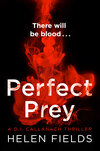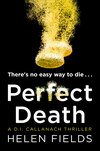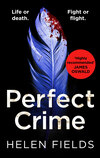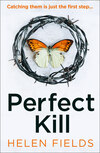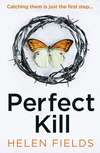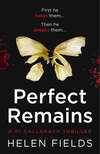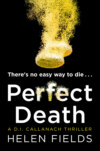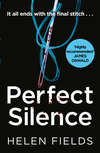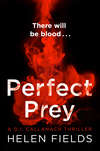Читать книгу: «A DI Callanach Thriller», страница 4
Chapter Eight
At home, a note had been stuck under his door.
‘Knock for me. Made way too much sausage casserole. Will keep it warm. Bunny.’
Callanach contemplated slipping into his apartment silently, before realising he’d spend the whole evening feeling guilty and rude, and opted for the path of least resistance. Bunny opened the door as he was knocking it.
‘Brilliant timing!’ she said. ‘I was just coming to see if you were home yet. Did you get my note? Of course you did, silly me, that’s why you’re here. Come on in. I was opening a bottle of red. Much nicer not to be drinking alone.’
Callanach murmured something noncommittal about how tired he was feeling but by then Bunny was pulling out a chair for him at a small table and putting a glass in his hand. The wine was cheap but drinkable. He was a grape snob – part of the French culture he’d inherited from his mother – but the food smelled good and he was hungry after walking miles around the city.
‘So I finally tidied up, thank goodness. Still got a few boxes to go, but it’s looking more like home. There’s tomato sauce if you want it. I can’t eat without it.’
‘I’ll pass,’ Callanach said. ‘So you’re settling in then?’ he managed, remembering his manners and the need to make small talk.
‘Oh yeah, been at it all day. And I’m having a flat-warming party next Saturday. I can introduce you to my friends. You free?’
‘I’m not sure,’ Callanach said, deciding to be at work whether he was needed or not. ‘I’m pretty much always on call. Never know what’s going to come up. Sounds like fun though.’
‘Oh, but I’ve told them all about you,’ Bunny said, piling more sausages in a beefy tomato sauce onto Callanach’s plate, and telling him every detail of her best friends’ lives as they made their way through dinner. ‘God, I nearly forgot. Some woman was at your door earlier. I did wonder what was going on, as she didn’t knock or anything, just stood there like she was trying to figure something out. She jumped a mile when I put my head out.’
Callanach’s stomach tensed. He put down his fork. If Astrid had reappeared he’d have to move. There was no way he could face being constantly followed again.
‘Did you catch her name?’ Callanach asked Bunny.
‘She didn’t really say much. Muttered something about how it wasn’t important. She’d see you tomorrow.’
‘Can you describe her?’ Callanach asked.
‘Sure, average height, longish brown curly hair. Grey eyes. Size eight to ten. I was wondering if it was your girlfriend.’
‘I don’t have a girlfriend,’ Callanach said, regretting the admission as soon as he’d made it.
‘I’m single, too,’ Bunny said, holding out her glass to be chinked. ‘That’s good. We can keep each other company.’
‘I should find out who that was at my door,’ Callanach said, already sure it was Ava and wondering what had prompted the visit. ‘But thank you for dinner, although you shouldn’t have worried about me.’
‘Oh, it’s no bother. We should make it a regular thing.’
‘I’m out a lot,’ he said. ‘Regular doesn’t work for me. I’ll bump into you occasionally though.’ Bunny’s face dropped and Callanach felt clumsy. He could have been kinder about it, not that kindness was necessarily the best way to put women off.
Back in his flat, he checked his mobile for messages. There was nothing. If Ava had been calling round about an urgent police matter she’d have left a text or voicemail. He glanced at his watch. Presumably she’d be at dinner with her parents and Joe Edgar by now. Still, Callanach thought, if she’d come looking for him it must have been important. He kicked off his shoes and dialled her number.
Her mobile rang only twice before she answered. He could hear conversation in the background, and a distant high-pitched voice making their disapproval of the fact that she was taking the call obvious to everyone.
‘Turner,’ Ava said. ‘Hold on please.’ A door closed and footsteps echoed on wood.
‘Ava, it’s Luc,’ Callanach said. ‘Is everything okay?’
‘Everything’s fine,’ she was terse. ‘Has something happened I need to know about?’
‘No,’ Callanach felt like he was treading through mud. ‘I just …’
‘Oh, right, the girl told you I’d been round,’ Ava said. ‘It was nothing. Just wanted to have a word with you about …’ she paused momentarily, ‘the Chief. I’m worried about him. Nothing that can’t wait until I next see you.’
‘Was that it?’ Callanach asked. ‘Sorry, I went to The Meadows to walk the scene again.’
‘No need to explain, and I apologise if I made things awkward with your neighbour. She told me she was waiting for you to get home for dinner.’
Callanach rolled his head backwards from one shoulder to the other.
‘She just moved in. I think she’s lonely. I really don’t …’
‘Well, I’m at my parents as you could probably hear, so I can’t chat. Catch you soon.’ Ava hung up. Callanach threw his phone onto the sofa and poured himself a more palatable glass of wine.
‘Fuck,’ he said, stripping off his suit and going to shower, running the water as hot as he could bear and climbing in with his glass still in hand, held just out of the stream.
He should have been able to walk away from work and relax. He wound back the clock inside his head and replayed memories of easier days in Lyon. He’d lived in an apartment he’d loved, with a terrace overlooking the park near Interpol’s headquarters. There had been girlfriends. Not that he’d flitted from one to another, but always someone to share a good meal, to hop in a car for a weekend away, to travel to the coast and waterski or sail. And there had been sex. Not like his early twenties when the fever to sleep with women had, at times, consumed him. When he’d used his model looks and intellect to charm and then entice any woman he’d wanted. Easy sex, without the emotional noose that tightened when he thought about it now. Astrid Borde and her false accusation of rape had finished him, both as an Interpol agent and as a man.
He turned his face up into the steaming spray of water and slid a hand down to his penis, willing it hard, trying to remember the last time he’d been with a woman. He conjured images of days and nights he’d spent intent on nothing but physical pleasure – sex on sand dunes, in planes, on boats, in hotels across the world. But now there was nothing. It was as if the muscle he’d once taken so much for granted had simply ceased to exist, leaving a useless flopping length of pitiful flesh to taunt him.
Then there was a flash of another face in his mind, a woman he’d tried not to think about. With it came the jolt of a feeling he’d all but given up on, his muscles performing no more than a spasm in his hand, a quickening inside before it evaporated.
Callanach grabbed the handle of the shower door, squeezing the metal as if he could crush it, growling aloud with the effort of trying to drag the life back into himself. But it had gone. That fleeting hope that he could be normal again.
‘Merde!’ he shouted, smashing a fist into the shower glass, getting nothing in return except bruised knuckles and a dull thud. ‘Je suis pathétique.’ He reverted to French as he always did when he lost control, although the message was the same in any language. He was pathetic. But his muscles had flared into life, if only for a second. It was proof, as if he’d needed it, that there was no physical damage. ‘Enough,’ he said, snatching a towel and throwing it over his shoulders.
As he walked through his bedroom, he paused to stare in the mirror. He was still in good shape, rarely going more than two days without punishing himself at the gym, naturally eating cleanly, always aghast at the piles of chips, pastry and white bread that seemed to flow through the doors of the station. He hated to feel bloated and heavy. His mother had lectured him about diet from before he could talk back. Fruit, vegetables and protein. Everything else was just excess. She’d long since stopped lecturing him. Had not communicated with him at all since his brief spell of incarceration before he’d been bailed pending trial. He got his olive skin from her, and his dark hair. No matter how long he lived in Scotland, his skin was never going to pale enough for him to pass as a native. It was as if his father’s Scottish genes had passed him by.
He ran a hand through his hair, pulling his shoulders back and inspecting his muscle tone as if he were buying a piece of meat. He’d let his head rule his body for too long, trying everything except therapy, save for those few embarrassing obligatory sessions with the Interpol psychologist before he’d served his notice.
Determined to move on, he opened his laptop and skipped through a variety of websites until he found one that looked vaguely professional, then he pulled his wallet from his jacket. In less than a minute he’d purchased a drug without prescription and left his credit card details online. It wasn’t clever but it wasn’t going to get him in serious trouble, even if he was caught. What worried him more, having finally made the choice to buy the drug that might offer him relief, was finding someone with whom he could use it.
Chapter Nine
Three weeks had passed since Sim Thorburn’s murder. Twenty-one days when each morning was marked by the increasing quietness and frustration of Callanach’s team. Today the atmosphere was different. Not in his incident room, but certainly across the hall. A body of men and women was massing at the station. The way they were dressed and the palpable excitement could mean only one thing. Callanach realised they were on a pre-raid briefing. DC Tripp caught his eye, and Callanach managed a nod in response before his purloined detective constable looked back at the whiteboard where DCI Edgar was pointing at the blueprint of a building and barking instructions. However much money the hackers had stolen, or ‘relocated’ as The Unsung had released a statement to explain, was enough to justify a huge public expenditure to ensure they were caught. Callanach wondered what the difference in governmental financing was between the hackers’ case and his investigation into Sim’s murder. Probably best not to know, he thought. That way lay only bitterness and disillusionment.
He had begun to accept that the trail to Sim’s killer had run from lukewarm to cold. It seemed more likely than ever that it was just some random attack, perhaps mistaken identity, perhaps someone Sim had crossed unknowingly. Since the funeral, his girlfriend had left Edinburgh and returned to her parents’ house in Newcastle, leaving only a forwarding address and a message to say how disappointed she was that there had been no progress. Callanach could sympathise.
Since then, he’d lost two more squad members to an attempted rape outside a nightclub, and even Begbie hadn’t asked for a progress report for a couple of days. Callanach watched as DCI Edgar’s team trotted out of the incident room and down the corridor like an army squadron given the go for a secret mission, albeit carrying warrants and laptops instead of guns. Tripp looked half-embarrassed, half-bored as he kept pace in the line towards the stairs.
‘Sir,’ Salter said, coming up behind him. ‘We’ve had this passed on from the uniformed team on duty. An elderly gentleman, missing all night. Wife is distraught. He’s never failed to come home before.’
‘The Major Investigations Team is doing missing persons now, is that right?’ Callanach sighed.
‘Seems likely to be more than that. His mobile and wallet have been found on a park bench on top of a pile of books. Name is Michael Swan. This morning he missed a community awards ceremony. He was due to be recognised for the child literacy programmes he’s set up across the city. Wife said he’d been looking forward to it for weeks.’
‘Sounds more like he’s had a breakdown and run away. Come on then, Salter. That’s if DCI Edgar has left any vehicles for the rest of us.’
They headed east across the city towards Craigentinny golf course. The expanse of greenery would have been visible from Michael Swan’s bedroom window, Callanach realised, as his wife described how her doting husband had always dreamed of retiring next to a golf course. Ironically, he’d then become so consumed with what began as a part-time librarian’s post that he’d barely picked up a club since.
‘Has he been unwell, or acting out of character at all, Mrs Swan?’ Salter asked, sipping the coffee that had appeared courtesy of an adult daughter who was comforting her mother.
‘No. My husband was a creature of habit. He came and went at certain times. Had clothes for work and clothes for the weekend. He always told me if something was bothering him. And I could tell, you know. It’s like that once you’ve been married long enough. But to leave his wallet and phone in a public place? He’d never be so careless.’ The daughter handed her mother more tissues from the box rapidly being used up and Callanach checked his watch. The library wasn’t normally open until later but the caretaker had agreed to meet them there and open up. If Michael Swan had left a note anywhere, it was likely to be on his desk.
At the library it was confirmed that Michael Swan had checked out with his swipe card at 8.37 p.m. the previous day. Salter immediately radioed through to the station for a CCTV check of the route he’d have taken to the point where his wallet and mobile had been abandoned. Callanach moved forward at the caretaker’s beckoning and looked through the documents left on a modern reception desk.
‘Is this where Mr Swan would have spent most of his time?’ Callanach asked.
‘Aye, here to check books in and out. The building is on two levels. Library down here, meeting rooms upstairs, used for educational programmes and whatnot. Sometimes authors come here to talk about their books. Other evenings it’s used for community meetings, you know, the local historical society, a dieting club,’ the caretaker leaned down to whisper in Callanach’s ear, ‘and the local alcohol and drug addiction service is in on a Wednesday, but we’re not supposed to talk about that. Bit sensitive for those attending, you know.’
‘And this is everything? He has no employee locker, no personal area?’ Callanach asked.
‘There’s a little staff area behind that glass there. Used for administration, but also for coats, mugs, a place to concentrate without being pestered.’
The caretaker unlocked another door into a thin room at the side of the main library hall, half wall and half obscured glass, with desks lining one side, and full of the sort of mess that busy, hard-working people leave in their wake.
‘Here you go, laddie. This was Mr Swan’s mug. I’m sure it’s all just a terrible mistake. He’s a good man. No harm’ll have come.’ The caretaker picked up a well-used, slightly chipped mug bearing the legend, ‘Eat well, drink well, read well’, clutching it to his chest rather too tightly.
‘Thank you,’ Callanach said. ‘We’ll have a quick look round and let you get on with your day.’ Across the main hall of books was the entrance hall where they’d come in. Steps leading upwards were signposted to education rooms. Another side door bore no marker. ‘What’s through there?’ Callanach asked the caretaker.
‘That goes down into the basement. Holds books not currently on the shelves, ones that need mending or replacing, old posters, redundant furniture. More of a storeroom than anything.’
‘Did Mr Swan have a key to that as well as to the front door?’ Callanach asked.
‘Not on his own set, although there’s one kept on the keys in the desk so the staff can get in if someone asks for a book that’s not on display.’
‘Could you get it for me please?’ Callanach asked.
‘I’m not sure why he’d have left anything in there, particularly. But I’ll open up anyway.’
The caretaker walked ahead and Callanach followed, checking the time. He was due in a meeting with the press liaison officer to give another useless update on the Sim Thorburn case, but he should at least phone and say he’d be delayed. The heavy door swung open and the caretaker reached around the side to flip on the lights. Nothing happened.
‘Fuse box?’ Callanach asked.
‘I’ll go and see,’ the caretaker said. ‘Give me a moment.’ He wandered off back into the main hall as Callanach stepped inside, taking the few steps down into the basement. The door had been heavier than he’d anticipated and it swung shut behind him. The area was effectively windowless, with a dim pane of glass glowing green-brown with moss and mud from decades of a lack of cleaning, and only the faintest vein of light from beneath the door at the top of the steps. Something rotten hung in the air, as if the basement had been built too close to a sewer pipe, polluting with its sulphurous putrescence.
Callanach took out his mobile and switched on the torch app that would drain the battery in no time, but it would do for him to get his bearings and stop wasting any more minutes. He walked between rows of books, all neatly stored, with boxes at the end of each line containing the expected jumble and junk. Children’s toys, some costumes, ageing furniture that no one had decided what to do with. He turned a corner, letting his phone shine at the floor, sensing rather than seeing obstacles as he walked away from the neat rows of books. There was a noise behind him. He spun round, disoriented. One foot flew out from beneath him and he threw a hand to the side to grab what he could to stabilise himself. His other foot followed the same fate, slipping on the floor, and his free arm shot up rather than out, clutching at the first thing it touched. It was a textile, smooth and slippery, wet on one side. Callanach shouted as he fell, landing on his back as whatever his hand had found loosened in his grasp. He closed his eyes as pain shot through his coccyx. A few moments later he repositioned his mobile and shone the light upwards.
Above him was, without a doubt, the body of Michael Swan. He had been suspended horizontally from a metal structural beam by his neck and his bound ankles. Callanach could only see fragments as the beam of torchlight moved, shakily, along the length of the corpse. Whoever had hung him had almost entirely skinned Swan’s face. Callanach had read numerous articles about it but never seen a case where it had been done. An incision had been made around the outer circle of facial skin, starting at one side of the lower jaw, heading up around the cheekbone, across the forehead and back down the other side. Finally, like a perfectly skinned rabbit, his face had been peeled.
Callanach felt the stickiness in his palm and knew that the resulting flap of skin had been what he’d grabbed as he’d slipped. He didn’t need the torchlight to confirm the pool of blood he was lying in.
‘Police officer, put down your weapons,’ Salter shouted from the doorway, no doubt assuming an assault and possible injury.
‘I’m all right, Salter. There’s no one else here.’ He may not have checked every inch of it, but Callanach was sure the assailant had left the building the night before, taking Swan’s mobile and wallet with them.
‘The fuse box is fine, the light bulbs must all have blown.’ Callanach could hear the caretaker’s voice getting closer.
‘Salter, get everyone else out of here right now. Close down the scene. Contact the pathologist immediately and call forensics in. Do not enter. I’ve already compromised the evidence.’
He could hear urgent instructions being given and the sound of footsteps disappearing away.
‘You sure you’re not hurt, sir? It sounded bad,’ Salter called.
Callanach unlaced his boots and left them where he’d trodden so as not to spread any more evidence around the room.
‘Missing person confirmed deceased. I’m uninjured. It’s going to be a difficult crime scene to process. I want an absolute lockdown on communications going out of here.’ Callanach moved gingerly towards the door, feeling his lower back as he went. He’d cracked it hard as he went down and parts of his legs were numb.
‘What the fuck?’ Salter said before she could stop herself. She started forwards to grab him, but Callanach raised a warning hand.
‘Don’t touch me,’ he said. ‘If there were trace fibres or evidence on the floor, they’re on me now.’
‘God, sir, you’re covered in it. Are you sure you didn’t injure yourself? Only that looks like too much blood …’ her voice trailed off.
‘Take a breath,’ Callanach said, ‘then call Begbie for me. He needs to see this for himself. I want the whole building sealed off. No one touches anything. Make sure the caretaker doesn’t re-enter this part of the building.’ He could hear his own voice shaking.
‘How bad is it, sir?’ Salter asked. Callanach just stared at her. ‘Will I send uniforms round to notify Mr Swan’s wife?’
‘That’ll be our job, I’m afraid, but this will take a while,’ he said. Sirens were approaching at a pace. Salter made her way out of the building to ensure that the scene was protected from the outside of the building in.
Callanach stayed as still as he could, knowing every item of his clothing would need bagging and testing. He tried not to think about the gore dripping from his trouser legs and hands. He had witnessed horrors before, but the gruesomeness of this was its staging, the dreadful dramatic love with which it had been conceived. Even to the point of smashing the light bulbs, he now realised, so that the full effect of the killer’s creation could only be witnessed in torchlight. Michael Swan’s face reduced to a horror mask, still dripping with bloody gore, would forever be a scream in his memory. He felt dizzy, sick, made himself take air and get a grip.
Technicians appeared carrying swathes of plastic sheeting and battery lights by which to work. They said little as Callanach described the scene so that they could properly equip themselves, both practically and mentally.
Ailsa Lambert arrived looking concerned, issuing businesslike orders.
‘You’re holding your back,’ she said, looking Callanach up and down.
‘I’m fine,’ Callanach said. ‘Just a slip. Ailsa, this may be the worst …’
‘I’m going to organise a car to take you home, Luc,’ she said, pulling out her mobile.
‘There’s no time,’ he said.
‘Then you’ll have to consent to a paramedic assessing you for shock. If you try and drive in the next two hours I’ll have you disciplined myself. Understand?’ Callanach considered arguing but didn’t. ‘Good,’ Ailsa said. ‘Now this. Is it torture?’
‘Yes. Not sure if it was pre or post mortem. He’s strung up parallel to the ceiling.’
‘My job would be easier if human beings had evolved without imaginations. Right, strip off – I’ll have someone bring you a suit. They’ll have to swab your hands and face as well. We’ll need every fibre,’ Ailsa said.
‘What happened to you?’ Begbie roared, storming towards them, almost bursting out of the crime scene coveralls he was wearing. ‘Has this whole city gone mad?’
‘You’ll achieve nothing like that,’ Ailsa told him gently. ‘And my crime scene needs minimal disruption so go in easy, if you don’t mind.’
‘And we’ve no idea who we’re looking for, is that right?’ Begbie aimed at Callanach.
‘Not as yet, sir,’ Callanach responded. The Chief was already pushing himself through the doorway into the basement that was still in the process of being lit.
Callanach heard a string of expletives bellowing from the storeroom in an ever more guttural and breathy Scots accent. Begbie was both furious and bewildered, a combination of emotions with which Callanach could sympathise. There was a pause, a loud groan, then a thud. Other voices called out. Ailsa and Callanach went running. DCI Begbie was on his side on the floor, one hand clutching his chest, feet paddling furiously against the pain.
‘Call the paramedics,’ Ailsa shouted to the nearest scenes of crime officer. The Chief’s breathing was more reminiscent of a marathon runner than someone who had recently made a trip of a few hundred yards from a car, hauling air in and chugging it out. Ailsa removed his tie and loosened his shirt while Callanach grabbed a torch from a passing officer. The additional light showed Begbie’s face as ashen but slick with sweat. His jaw was clenched tight, eyes wide. Callanach took hold of Begbie’s right hand, half expecting rejection. The Chief squeezed Callanach’s in silent reply, gripping hard, holding on. Blood trickled from his knees and hands where he’d hit the floor and he looked unexpectedly like a victim. Confused, scared, helpless.
‘Help me sit him up,’ Ailsa said to Callanach. They sat the Chief with his back against a stack of boxes while a technician fetched a blanket. ‘George, these are aspirin. I want you to chew them slowly,’ she said, pushing two small pills into Begbie’s mouth. He grimaced but made the effort, his hands shaking as he steadied himself. ‘By God, man, I’m not supposed to be here looking after you. Have I not got enough to be getting on with? Quite the shock you gave me!’
Begbie did his best to issue a response, but managed nothing other than a breathless wheeze, and went back to chewing. Ailsa checked him over for other injuries, wiping her face when the Chief closed his eyes for a moment. If Callanach didn’t know better he’d have thought she was wiping away tears.
The paramedics were inside before anyone could get crime scene suits on them or even shoe covers. It took only a couple of minutes for them to get Begbie onto a stretcher with an oxygen mask covering his mouth and nose, but in that time Callanach saw the look on Ailsa’s face turn from deep concern to complete frustration. Bloody footprints ran all the way across the floor. Begbie had fallen into the middle of the key forensics area, followed out of necessity by the men saving his life. Everyone stopped, hands on hips, shaking disbelieving heads at how much more complicated and unlikely to yield results their tasks had just become.
‘I’ll follow him to the hospital,’ Callanach said. ‘Would you mind calling Ava, please Ailsa? She’s friendly with the Chief’s wife. Someone ought to pick Mrs Begbie up.’
Начислим
+6
Покупайте книги и получайте бонусы в Литрес, Читай-городе и Буквоеде.
Участвовать в бонусной программе
